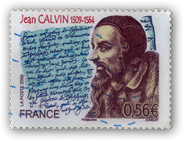Protestants en poitou, Généalogie des familles huguenotes du 16e et 17e siècles
History
Beginning of reformed Religion
In 1534, Calvin stays at the University of Poitiers where he meets professors and students who become enthusiastic about the concepts of the Reform. Their passion is soon shared by some town dignitaries as well as a few religious people. The ideas of the Reform spread rapidly in the Region and give birth to an evangelic community which soon gathers people originating from different classes of the society.
In 1546, the Parliament of Paris notes that « au pays de Poitou, l’hérésie pullule grandement », meaning that in Poitou, heresy is spreading wildly.
During the same period, inhabitants of Lusignan, Saint-Maixent and Niort are prosecuted by the « Chambre Ardente » (religious people who are in charge of eradicating heresy). Until 1555, the faithful gather in private homes in order to pray and to read the Holy Bible.France will then undergo 40 years of religious wars, until the signature of the Edict of Nantes by Henry the Fourth on April 13, 1598. Under this new edict, freedom of conscience is granted to the Huguenots in all the Kingdom of France, as well as freedom of religion together with the right to build churches and the possibility to gather synods.
The revocation of the Edict of Nantes
Louis XIV ends these freedoms when he revokes the edict at Fontainebleau on October 18, 1685 : he forbids the cult, orders that all Protsetant churches be destroyed and forces all French people – except in Alsace – to be baptized and to be married in the Roman Catholic faith.
